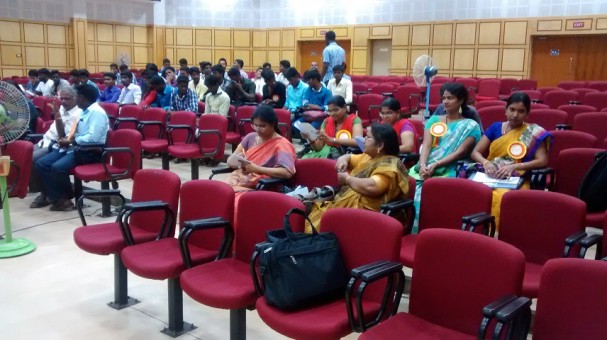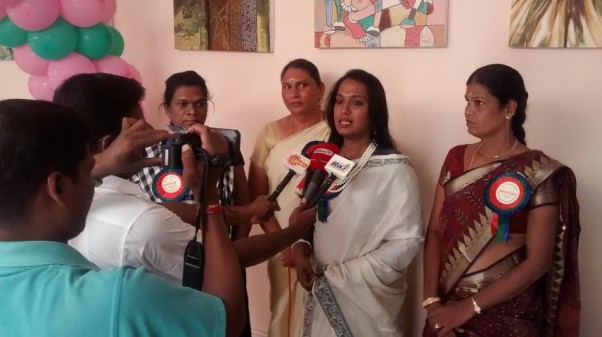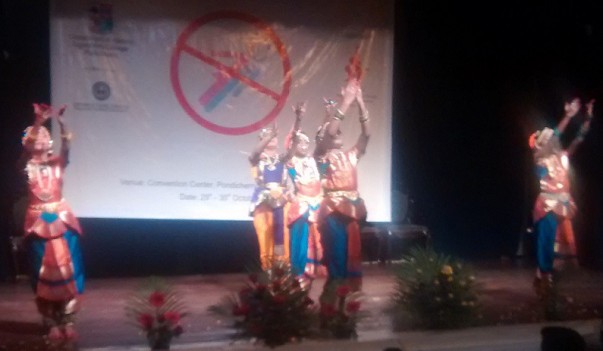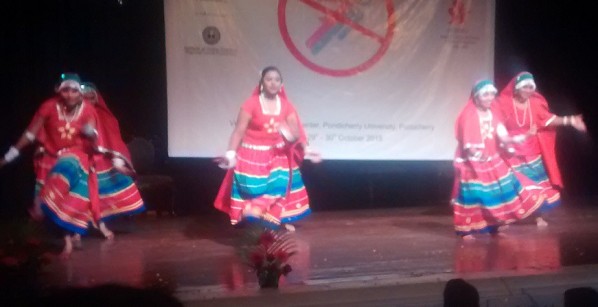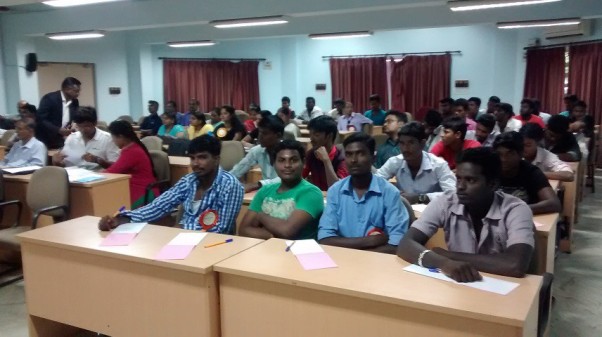The Proceedings of National Seminar on “Transgender People: Stigma, violence and Discrimination”.
The two day ICSSR sponsored National Seminar on “Transgender People: Stigma, violence and Discrimination” was held at the Pondicherry convention Centre, Puducherry on October 29th and 30th 2015. Ironically, in the official website, “t” is missing in “stigma”[1]. The title appears to be inspired from the “Social justice” department[2]. About 10.30 am, the seminar was inagurated as usual with prayer and lighting of “kuthuvilakku”, honouring the guests etc! The convener of the seminar Dr Sandeepkumar Dasari welcomed the invitees and delegates and then, explained the purpose of the seminar to address the problems and solutions of the issues related to transgenders. The theme of the seminar was divided into –
- Transgenders rights: Law, society and workplace and
- Transgender rights: Social acceptability, political freedom and health.
for the two day proceedings. He recalled his experience in attending a seminar on transgenders at Annamalai University some years ago.
Inagural function (29-10-2015): Dr Fr Rajanayagam (11.31-11.50 am) S. J, Former Dean, Scholl of Media Studies, Loyola college, Chennai gave the keynote address. His points were –
- The term “transgender” is debatable.
- Matriarchal society treats them as “women”.
- In the patriarchal type of society, the males feel threatened by the transgenders (hereinafter mentioned as TG).
- The role of media is missing in the themes of the seminar.
- The media portrayal of transgenders has been negative.
- The 24×7 TV channels feed news created have also been dominated by the male chauvinistic and patriarchal people.
- Therefore, TGs find very difficult to come over such patriarchal society in any field.
- The awareness about TG should be created and started from school level. For that sex education should start from schools.
Then, Kalki Subramaniam (11.52-12.16 am) started explaing her position to become a TG. She faced a lot of agony and trauma during the school days. From 5th to 12th standards, she was harassed. “For my higher schooling, my parents enrolled me in a boys high school and I hated that. I had no close friends in school. My classmates would tease me and verbally abuse me for who I am. My teachers too would mock at my effeminate character. I was hurt so much and was longing for true, understanding, compassionate friends. To escape the hurt, I used to bunk classes and hide in a park. That is where I found Apsara who later became my mother in the Thirunangai (Transgender) family. Apsara was a transsexual woman who also faced stigma and discrimination. She was a few years elder to me. Through her, I met many transgender people and at that young age, I had already become a part of the transgender family,” she explained[3]. At one stage, she thought of committing suicide. Even the intellectuals refused to treat TG with respect. None wants to have friendship with TG. “We are like women, but we cannot beget children”, she explained. Pointing out that the facilities provided by the State government were not enough, she wanted them treat them properly. She requested the delegates to speak, support and be an ally of TG for the cause.
The presidential address was given by Dr V. Ramassamy, Principal, Tagore Arts College, Puducherry. Thiru V. Selvam, Regional Director, Regional Centre, Institute of Social Science, Puducherry collaborator of the seminar also addressed briefing the theme pointing out the “historical mistake” had to be corrected, as the government took 60 years to declare that transgenders are “third gender”. Prof Natarajan, also presented his views on the issue. Prof R. Natarajan and Tmt Manisoundararajan were honoured. The inaugural function was concluded by 12.30 pm with the vote of thanks by Thiru N. Sivaraman.
By 1.30 pm, the panel discussion started with the following:
- Dr Fr Rajanayagam S. J, Former Dean, Scholl of Media Studies, Loyola college, Chennai.
- Dr E. M. Ashok, Sexologist and Adplscent Health Counsellor, Erode.
- Revathy, TG activist, Namakkal, Kerala[4]
- Olga Arran, TG activist, Chennai.
- Prof Swarupa Rani, Department of History, University of Hyderabad, Telengana.
Prof Swarupa Rani started the discussion. Revathy explained as to how she travelled her life to become TG facing mental torture and verbal violence. “I was originally a boy named Doraisamy. Although my parents accepted my sexuality privately, they discouraged me from dressing as a woman in public. I could not find a job and depended on them, financially.” It was when Revathi moved to Bangalore, the nearest city to her home town Namakkal in Tamil Nadu that she came into her own[5]. “A woman I had known from Mumbai, who was like my mother, told me about the Hamam[6] culture — a household where many ‘hijras’ reside together like a family — prevalent in the city and introduced me to one of them,” she adds. Revathi, now 45, spent nearly two decades in the city before she went back to her home in 2011 to take care of her aging father. During her time in Karnataka, she was involved in various campaigns for the rights and entitlements of sexual minorities and other marginalised communities. Additionally, she had served as the director of Sangama, an NGO that has been championing the cause of sexual minorities and sex workers for more than 10 years. In July 2010, Penguin India published her autobiography The Truth About Me, which feminist historian V. Geetha translated into English from Tamil. Today, Revathi continues to write and be a voice for the rights of girls, women and sexual minorities[7].
“If a TG marries, whether she could satisfy man in all aspects?”, when this question was asked, Revathi responded, “Man-woman relationship is not sex alone. They can lie happily without child like any other normal couple, who do not or could not have children.” “By living together, the TGs help each other to reduce their mental stress or any other psychological problems”, thus suggested for TGs. Olga B. Arran translated Revathy’s speech and as well as answers responded to the questions asked.
Olga B. Arran emphasises[8] on the role that parents have to play in every individual’s life. According to her, one’s biological family is the strongest support system they can have. Running away from them is a big mistake. Instead, trans people must try to involve them in their life changes. Transgenders must also educate themselves, acquire life skills, and seek employment. Sex Reassignment Surgery (SRS) has some practical difficuties, as it could not produce desired results, in the sence, it cannot make TG a complete woman. Moreover, it requires more money to have SRS and that is why, the poor have to go to Government hospitals, where it is done free. Transgenders in India battle with a lot of stereotyping. They do not find employment easily and are resigned to work as either beggars or sex workers. Olga believes that one of the major issues that transgenders face in India is that of ostracism. Her aim is to empower transgenders and enable them to lead a dignified life. She started working for women and children and created BRAVOH in 1997. The movement began as an attempt to sensitize legislators, judiciaries, policy makers, academicians, and civil society policy and legal level trans-woman inclusion.
After this, paper reading session started with the presentation of the following papers:
- Dr S. Babu, Head, Department of Histry, KMCPGS, Puducherry– Transgender, the third sex, their problems and perspectives.
- ………………………………………Ponneri
- Chalapathi Rao, Head, Kastuba College for Women, Villianur Puducherry – Comprehended Social discrimination against Transgender.
- V. Ramakrishna Rao, Independent Researcher, Chennai – From Harem to Zanana to Society – the struggle of Transgender in Southeast Asia.
Dr Fr Rajanayagam chaired the session.
Again there was evening session with the presentation of the following papers:
- Dr Lilly Arul Sharmila, Asst.Prof of English, Tagore Arts College – The replenished state of transgender envisioned by the government of Tamilnadu with austerity measures.
- Dr E. M. Ashok, Sexologist and Adolscent Health Counsellor, Erode – Psycho-Social problems of Third gender in Erode District.
- Mercy Gnanabai – Transgenders and their problems[9].
Evening, there was a cultural programme by young children and girls with the performance of Bharatnatyam, Lambadi dance and Kuravanchi. They displayed their skill wonderfully with their mudras and postures. With the dinner, the first day seminar proceedings were over.
The second day of the seminar (30-10-2015): The second day seminar proceedings were started with the panel discussion containing the following:
- Dr Santhanam Prabhakar
- V. Ramakrishna Rao, Independent Researcher, Chennai.
- Ms Kalki Subramanian, Founder, Sahodari Foundation, Villuppuram.
- Mrs Sandya, TG activist, Chennai.
It was chaired by Prof Farida Siddhiqi, Head, Dept.of economics, M.A.N.U. University, Hyderabad. Praphakar expounded the efforts made by the government for the welfare of TH communities. K. V. Ramakrishna Rao pointed out the dichotomy nature of approach involved in issues and problems dealt with. Ms Kalki Subramanian expressed that he did not want to be a “woman”, to undergo all sufferings of woman. Sandya was responding to several critical questions asked by the students. She also briefed about her life as to how she became a TG, when her family rejected her and refused to accommodate her. Her traumatic and painful experience made everyone moving.
After this, the session continued with the presentation of papers by the following:
- Abdul Thaha –Discrimination and exclusion of LGBT community in India: A critique.
- Shahin Sultana – Supporting transgender children: understanding the role of multiple stakeholders.
- Cyril, Ph.D scholar, Presidency College, Chennai – Social and cultural rights of transgenders.
- Rukmani – Cultural history versus social irony: Encounter with transgender revelations as seen in Saravanan’s autobiographical work “I am Vidhya”.
After lunch, the last session continued with the presentation of papers by the following:
- Parameswari – Social exclusion of transgender and the role of NGO in the welfare of transgender.
- Hepsibai Natchathiram, Kanchi Mamunivar Centre for Postgraduate studies, Puducherry – Transgender inequality and discrimination[10].
- Farida Siddiqi, Head, Dept.of economics, M.A.N.U. University, Hyderabad – discrimination of transgender in the labour market: the Hyderabad context.
- Banu, Kanchi MamunivarCentre for Postgraduate studies, Puducherry – Transgender love and married issues – An analysis[11].
- Dr Atulya Bhoi, Asst.Prof of Commerce, Tagore Arts College – Livelihood of Transgender – An Analysis.
The Valedictory function: The two day seminar continued with panel discussion, paper presentation, personal anecdotes of the invited TGs, with active participation of delegates and students. They had been lively in participating in the discussion and active in asking questions and getting clarifications from the paper presenters. The valedictory function was started with the welcome address by Tmt. Rooccumani. The special address was given by Dr Santhanam Prabhakaran, in which he pointed out the provisions made by the Government of India that had to be utilsed by the TGs properly. The presidential address was given by Dr V. Ramassamy congratulating Dasari to conduct the seminar on the subject of TGs. The valedictory address was given by Prof N. Rajendran, Dean, School of arts, Bharathidasan University, in which he traced out the TG origin in the enigmatic illustrations of Indian mythology. The function was concluded with vote of thanks by Prof Dasari, the convener.
- Hiding facts and partial exposure of reality,
- sensitive discussion and emotional reaction,
- efforts to solve problems and overemphasizing rights,
- appreciating the judicial decisions and opposing the legal framework,
- presentation of facts with ideological orientation,
- borrowing ideas from western countries and opposing that they do not suit to “Indian conditions”,
- When “Indianness, culture” etc., is mentioned, questioning, “What is Indian culture?”, and such types of interactions and encounters are found.
The issues, problems and solutions concerned with lesbians, gays, bisexuals, transgenders, intersex, queer (LGBTQ) groups have been sensitive, complex and controversial too. Though, some of them have been risen to elite status through their hard work breaking the stigma, struggling against the violence and overcoming social hurdles, most of them have been suffering due to poverty, ignorance, and other related factors. Even the discussion of fundamental concepts, the reality of the complex issues and solving efforts lead to difference of opinion, misunderstanding, and misapprehension.
[1] http://www.issin.org/transgender-people-sigma-violence-discrimination,-29-30-october-2015.pdf
[2] http://socialjustice.nic.in/pdf/chapter7.pdf
[3] http://ai.eecs.umich.edu/people/conway/TSsuccesses/Kalki/Kalki.html
[4] As given in the prgram sheet, p.3
[5] The Hindu, My life, my way, October 9, 2012.
[6] It should be “harem” culture, not “hamam”!
[7] http://www.thehindu.com/features/metroplus/society/my-life-my-way/article3978249.ece
[8] http://queer-ink.com/olga-aaron/
[9] She explained the stories of American transgenders as found in the Feisberg’s books. See Abstract of the proceedings of the Seminar, p.11.
[10] Her paper dealt with the book “The Transgender studies Reader – Transgender History” by Susan O’ Neal Stryker.
[11] Kalki objected to it, as the situation related to American society and it could not suit Indian society. Banu dealt with the successful married life of transgender Helen Boys’s husband. See Abstract of the proceedings of the Seminar, p.23.
Filed under: agony, aravani, begging, bisexual, female, gay, gender, harem, hijira, intersex, justice, lesbian, male, prostitution, queer, sex, sexual, siva-sakti, stigma, third gender, thirunangai, transgender, violence | Tagged: aravani, arthanareswara, begging, bisexual, boundary, discrimination, gay, gender, harem, hijira, intersex, justice, kalki, lesbian, poverty, prostitution, queer, revathi, sex, sexual, siva-sakti, stigma, third gender, thirunangai, transgender, violence | 1 Comment »





